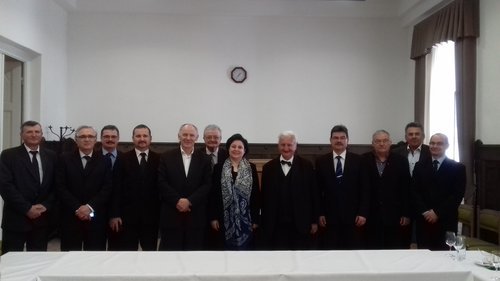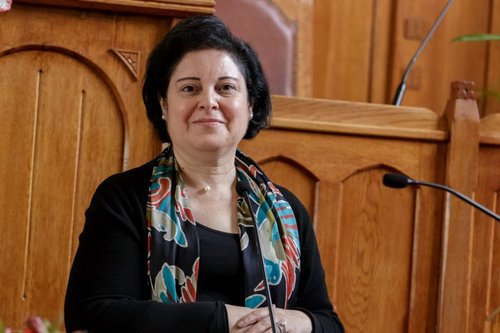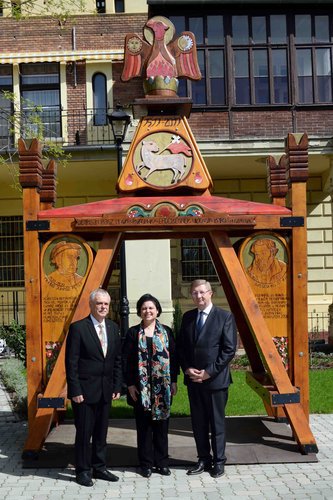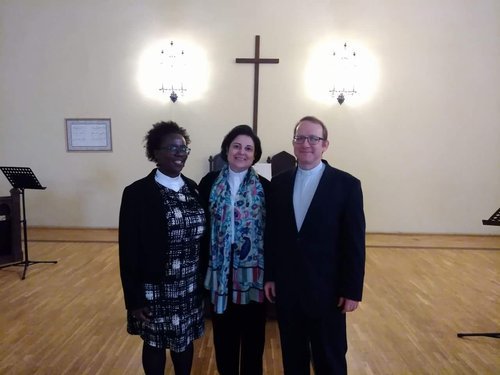WCRC President, Rev. Najla Kassab visited Hungary for the first time to attend the WCRC Europe Area Council meeting. During her stay in Hungary, Rev. Kassab attended various meetings and met with officials of the government, as well as leadership of the Hungarian Reformed Church (HRC).
Rev. Najla Kassab currently serves as President of the World Communion of Reformed Churches (WCRC) as an ordained pastor of the National Evangelical Synod of Lebanon and Syria (NESSL). She visited Hungary for the first time, not only to attend the WCRC Europe area council meeting, but also to meet with local leadership and churches.
On Thursday, 12 April, Rev. Kassab, met with Tristan Azbej, Deputy State Secretary for the Aid of Persecuted Christians. They spoke of the needs of those in the Middle East and how Hungary may be able to help. Rev. Kassab was delighted to hear of the support of the Hungarian government specifically for the Christians in the Middle East. She believes that by supporting Christians open to dialogue in the Middle East, they in turn may help those of other faiths, including Muslims. The belief behind the support given to the churches in the Middle East will encourage Christians to continue to open their hearts for ecumenical dialogue.

In the afternoon, Rev. Kassab met with the Presidium of the General Convent, including RCH Presiding Bishop, István Szabó to continue in the conversation of the support of the churches in Hungary for the Christian communities in the Middle East. She said that the strength of the churches in Hungary in supporting the Christian minorities helped to empower them, fostering hope in their lives. She stressed that being a minority did not mean weakness. As an example of the strength and social impact of the minority community, she shared that it was the evangelical communities in Lebanon and Syria that first introduced education for women in the Ottoman Empire, “It used to be a shame for women to go to school, today, it is shameful when a woman does not have any education,” she said. Rev. Kassab emphasized the importance of ministering through education being done in the Hungarian Reformed communities, as well as the NESSL church communities.
The Presidium of the General Convent consists of all the bishops and lay presidents of the Hungarian-speaking Reformed churches in the Carpathian Basin. At the beginning of this year, the Presidium decided to support the scholarship program for Syrian students, by offering 7 000 USD to the Scholarship for the Church Schools run by NESSL and UAECNE in Syria through the HEKS/EPER Aid Organization of the Swiss Reformed Churches. The grant allows for the continuing support of 1 500 students through scholarships during the 2017-2018 school year. Through the scholarship project, the Hungarian Reformed community supports the hard work and dedication of the church schools to provide education to children and promote inclusivity within the schools.

After the conclusion of the WCRC Europe meeting on the 14th of April, Rev. Kassab participated in the Mission Conference of the RCH titled Reformed Witness in Critical Times. She spoke of the life and mission of NESSL churches in the Middle East, sharing the experiences of the churches in Lebanon that were greatly affected by the vast number of refugees. The fear towards the refugees quickly turned to welcoming arms, “When these [refugee] children began to attend our churches, we gained new experiences. We soon realized that our mission was to step out of the walls of our churches and begin to take notice and care for the real people suffering around us,” she said at the conference for the Hungarian audience. Rev. Kassab encouraged engagement with Christian communities in the Middle East, emphasizing that the churches in the region are open for dialogue and cooperation. She reiterated the importance of education as a tool for hope of a future to the young people. By educating the young people, we can prepare refugees to return to their homes after the end of the war. She expressed how much she looks forward to continuing cooperation, and encouraged churches to speak up against the war while also continuing to pray and advocate for peace.

That same day, Rev. Kassab visited the Great Church and the Reformed Collegium in Debrecen. She met with Bishop Károly Fekete of the Transtibiscan Church District, Rev. Zsigmond Vad, Dean of the local Presbytery, and Rev. László Gonda, the Ecumenical Officer of the Transtibiscan Church District to learn first-hand of the life and mission of the region, as well as the Presbytery. She also had a discussion with the Rector of the Debrecen Reformed Theological University, Dr. Zoltán Kustár.

Together with Ministers of the Scottish Mission
The President of the WCRC ended her journey in Budapest. She was invited as the guest speaker at Scottish Mission in Budapest, the English-speaking congregation of the RCH. She spoke of the two types of peace: one of joy and satisfaction, and another of confronting those against the will of God. She emphasized the importance of taking risks and taking a stand against wrongs in the name of the peace of Christ. She believed that in order for us to share in the joyful peace of Christ, we must also stand up to injustice, working in the peace of Christ for justice. Then she spoke of the role of the Church, “Living peace in the hope of achieving goodness for all people is our task as the Church. Both when we relax and enjoy peace, and when we are angry and do something to overcome the evil.” In conclusion, Rev. Kassab encouraged that as Christians, it was our duty to speak up against inhumane and unfair practices, and that we take the peace of Christ, not only in times of satisfaction, but also in times of turmoil.
Written by Priscilla Yang
Photos by János Barcza, Aaron C. Stevens, Reformatus.hu/Vargosz